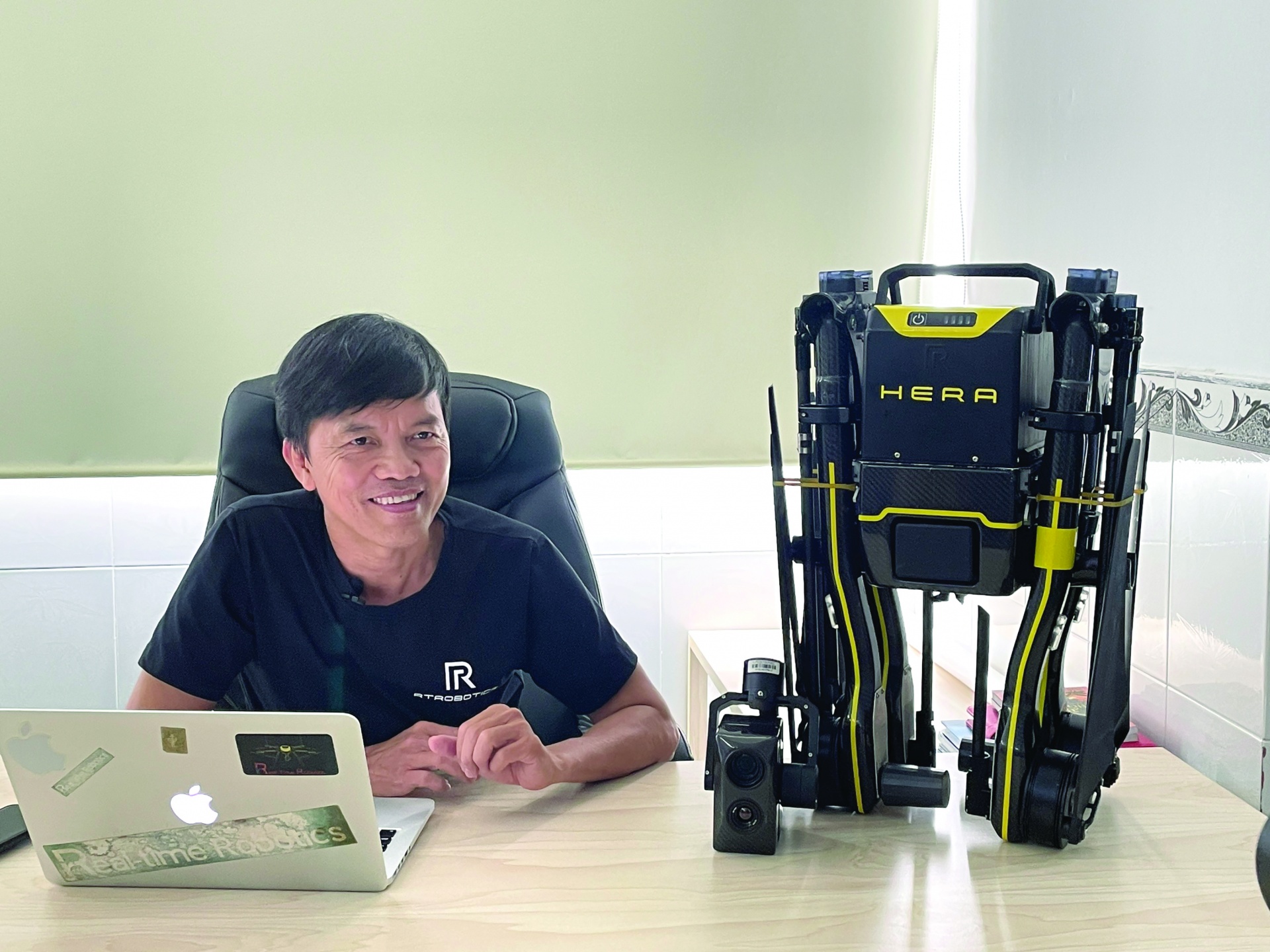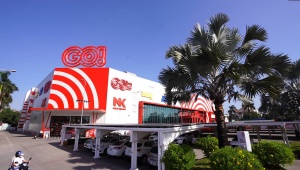Luong Viet Quoc: The first Vietnamese exporting drones to US market
Currently, Real Time Robotics Inc. (RtR) engages in manufacturing several hundred to 1,000 drones a year. The company is rushing to finalise the legal setup for building manufacturing facilities at Saigon High-Tech Park in Ho Chi Minh City later this year.
Luong Viet Quoc is also the first one awarded an investment license at the park to open a drone manufacturing plant in Vietnam.
Once completed, RtR would scale up its drone production capacity by 10-20 fold over the current level.
 |
| CEO Luong Viet Quoc with his newly-released HERA drone |
In 2023, when RtR’s drone manufacturing facilities and output markets are gradually put into order, the company is expected to reap at least $10 million in profit with growth touching 50 per cent annually.
After the US market, RtR aims to foray into the EU, Japan, Australia, New Zealand, and India.
From a street boy...
Luong Viet Quoc’s childhood was attached to the Nhieu Loc-Thi Nghe canal where most inhabitants lived in slum dwellings, with days when he collected waste to make subsistence until 1-2am.
At the age of 13, Quoc came to Cau Muoi wet market selling lemons and hot red peppers to make a living. From the age of 15, his occupation was fishing out filaria for sale.
Quoc’s fate was similar to most kids living in the area, one single difference was that he continued going to school while his peers in the area all stopped learning.
“At that time, the only reason that kept me going to school came from my paternal grandmother who repeatedly told me that only study could change one’s life,” Quoc recalled.
After finishing grade 12, Quoc failed the exam for university, so he continued to study at the Ho Chi Minh School of Finance. Then he took on in-service training and English courses.
In 1994, Quoc won 610 scores and ranked sixth out of 150 candidates joining the TOEFL exam hosted by Vietnam-US Scientific and Technical Cooperation Committee.
In 2002, Quoc was one of 26 bright individuals winning US Fullbright postgraduate scholarships.
In the US, Quoc joined a master-degree training programme and got offers from eight US leading universities for a doctorate course. After finishing his studies, he stayed in the US for work.
...to making drones
Recognising that drones are increasingly commonplace with very practical applications across the board, in 2014, Quoc founded a star-up with drones in San Francisco.
In 2017, he formed RtR in Vietnam and became the first Vietnamese licensed to manufacture drones.
Quoc recalled that “don’t try” was the common mindset of most investors by that time.
| With concerted efforts, RtR now consists of 50 engineers, all Vietnamese who care about design, materials, electronics parts, and programming. |
“Most people accepted failure right from inception with the mindset that the hardware, even common housewares like TV or fridges, couldn’t compete with global tech giants like China or Japan, let alone drones which is quite a novel field in Vietnam. But competition in pricing is just one part. We might noy necessarily join in such a competition. Instead, let’s create new preeminent functions, making the consumers willingly pay more for these new functions. This also gives an advantage,” said Quoc.
The initial time was tough for RtR as no big investor or venture fund dared to spend on the company’s drone manufacturing project.
A few equity investors later accepted to venture with RtR’s project. At present, RtR’s total investment value comes to around $4 million. With that the firm has harvested, such investment value proves rather low.
With concerted efforts, RtR now consists of 50 engineers, all Vietnamese who care about design, materials, electronics parts, and programming.
HERA drones creating a stir
This May, Quoc and the engineering team at RtR have amazed the tech cycle by creating their HERA drones.
Most HERA drone devices such as the hull, the hand, locking devices, circuit board, and control software are all designed and manufactured by RtR engineers, with self-design and manufacturing rates reaching 90 per cent.
HERA ingeniously integrates both small-size portability and heavy lift capacity, both backpack compactness and ample space for four payloads, plus 360-degree visibility for every payload, and ensures data transparency and security.
This month, RtR exported three HERA units to the US market which has witnessed stiff competition with demanding requirements in information security, sensor number, and more.
“A HERA drone now costs from $20,000-30,000 a unit, about 20-30 per cent higher compared to market price, but with creative functions. Therefore, our customers willingly pay more to have such compelling functions,” said Quoc.
Besides HERA, RtR has been developing other drone lines to serve Vietnam’s agriculture, helping to detect worms, support spraying, and complement plant nutrition.
With these drone lines, all the relevant data is kept in Vietnam, instead of sending back to the mainframes overseas as with other imported drones.
“The operating cost of these drone lines is remarkably lower than those imported from China, helping the farmers to save an average $3,000-$4,350 per year in the operating cost,” said an engineer from the RtR team.
 | Thai giants continue to bet on Vietnamese market Thai giants continue to bet on the Vietnamese market to avail opportunities from the two country’s strengthened bilateral ties. |
 | Vietnamese car market recovers after bottoming out After a record decline in August, Vietnam's car sales in September have bounced back, a positive sign for the year-end shopping season. |
What the stars mean:
★ Poor ★ ★ Promising ★★★ Good ★★★★ Very good ★★★★★ Exceptional
Related Contents
Latest News
More News
- SK Innovation-led consortium wins $2.3 billion LNG project in Nghe An (February 25, 2026 | 07:56)
- THACO opens $70 million manufacturing complex in Danang (February 25, 2026 | 07:54)
- Phu Quoc International Airport expansion approved to meet rising demand (February 24, 2026 | 10:00)
- Bac Giang International Logistics Centre faces land clearance barrier (February 24, 2026 | 08:00)
- Bright prospects abound in European investment (February 19, 2026 | 20:27)
- Internal strengths attest to commitment to progress (February 19, 2026 | 20:13)
- Vietnam, New Zealand seek level-up in ties (February 19, 2026 | 18:06)
- Untapped potential in relations with Indonesia (February 19, 2026 | 17:56)
- German strengths match Vietnamese aspirations (February 19, 2026 | 17:40)
- Kim Long Motor and AOJ Suzhou enter strategic partnership (February 16, 2026 | 13:27)

 Tag:
Tag:


























 Mobile Version
Mobile Version